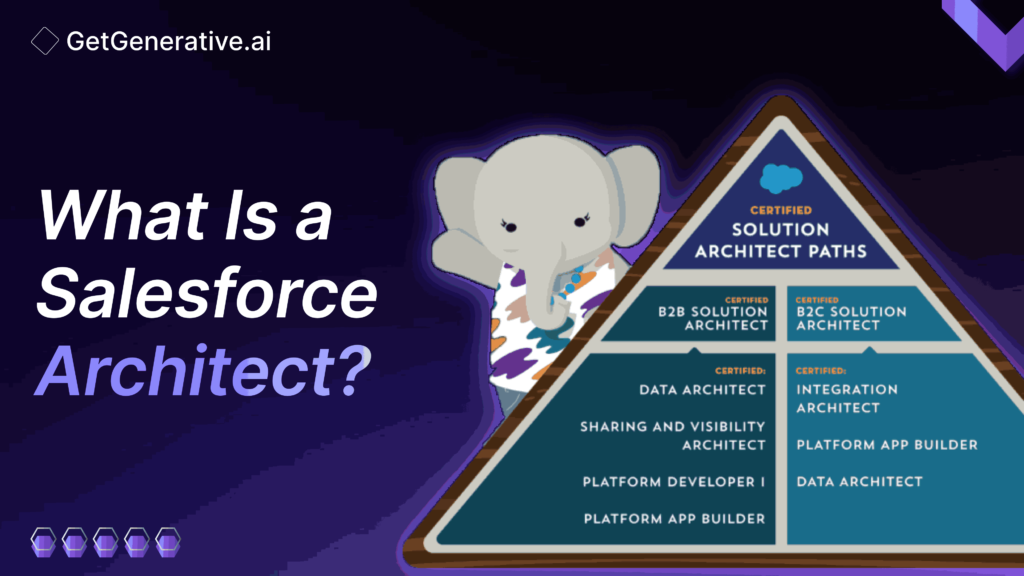What Is a Salesforce Architect?
A Salesforce Architect plays a crucial role in designing and delivering robust solutions for enterprise-grade customers using Salesforce products. These professionals are pivotal in ensuring successful Salesforce implementations, making them invaluable in today’s business landscape.
This blog explore what a Salesforce Architect does, the skills required, career prospects, and relevant certifications.
What is a Salesforce Architect?
A Salesforce Architect is responsible for designing and delivering scalable and maintainable solutions using Salesforce products. They recommend the best solutions for given requirements, balancing trade-offs to ensure long-term stability and minimal technical debt. Their role is essential in complex implementations, guiding architectural decisions using Salesforce’s Well-Architected framework and core values: Trusted, Easy, and Adaptable.
Key Skills of a Salesforce Architect
Successful Salesforce Architects possess a blend of technical expertise and soft skills, making them indispensable in their roles. Here’s a deeper dive into the key skills required:
Technical Expertise
- Comprehensive Salesforce Knowledge: Understanding the Salesforce platform, including Sales Cloud, Service Cloud, Marketing Cloud, and more.
- Coding Proficiency: While not necessarily developers, architects must understand Apex, Visualforce, Lightning components, and other Salesforce development tools.
- System Integration: Expertise in integrating Salesforce with other enterprise systems using tools like MuleSoft, REST/SOAP APIs, and middleware platforms.
- Data Management: Strong grasp of data modeling, database design, data migration, and data quality best practices.
- Security and Compliance: Knowledge of Salesforce security features, identity and access management, and regulatory compliance requirements (e.g., GDPR, HIPAA).
Soft Skills
- Effective Communication: Ability to articulate complex technical concepts to non-technical stakeholders and collaborate with various teams.
- Listening Skills: Keen ability to understand business requirements, pain points, and objectives through active listening.
- Presentation Skills: Proficiency in creating and delivering compelling presentations and technical demonstrations to diverse audiences.
Declarative Expertise
- Clicks Not Code: Proficiency in using Salesforce’s declarative tools (e.g., Process Builder, Flow, and Custom Objects) to build solutions without code.
- Customization: Ability to leverage Salesforce customization options effectively to meet specific business needs without overcomplicating the system.
Integration Knowledge
- Cross-Platform Integration: Experience in integrating Salesforce with ERP systems, marketing automation platforms, and other third-party applications.
- Middleware Usage: Utilizing middleware solutions like MuleSoft for seamless data flow and integration.
Governance and Development Operations
- Development Lifecycle Management: Understanding of development methodologies (e.g., Agile, Scrum) and tools (e.g., Jira, Git) to manage the development lifecycle.
- Governance Frameworks: Implementing governance frameworks to ensure compliance, data integrity, and system stability.
Business Acumen
- Strategic Vision: Aligning technical solutions with the strategic goals of the business to drive innovation and efficiency.
- Problem-Solving: Utilizing analytical skills to troubleshoot issues and develop robust, scalable solutions.
Also Read – Salesforce Architecture Basics: An In-Depth Guide
Responsibilities of a Salesforce Architect
A Salesforce Architect’s responsibilities are multi-faceted, requiring a blend of technical prowess and leadership skills. Here’s an expanded look at their key responsibilities:
Design and Strategy
- Solution Design: Crafting robust, scalable solutions tailored to business needs. This includes choosing between declarative and programmatic solutions based on the context.
- Data Modeling: Creating comprehensive data models that support business processes while ensuring data integrity and performance.
- Scalability Planning: Ensuring that solutions are scalable to accommodate future growth in users, data volume, and functionality.
Implementation and Integration
- Technical Solutions: Implementing solutions for identity and access management, data integration, and large data volumes.
- Process Integration: Designing and integrating business processes across different systems to ensure seamless operations.
- Custom Development: Overseeing custom development efforts, ensuring best practices in coding, and optimizing performance.
Team Leadership and Education
- Team Leadership: Leading technical teams, providing guidance on best practices, and fostering a collaborative environment.
- Education and Mentorship: Educating team members on Salesforce best practices and emerging trends, and mentoring junior architects and developers.
Business Alignment and Advocacy
- Stakeholder Collaboration: Working closely with business stakeholders to understand their needs and translate them into technical requirements.
- Technical Advocacy: Advocating for the adoption of new technologies and solutions that align with the organization’s goals.
- Proof-of-Concepts (POCs): Developing POCs to demonstrate the feasibility and value of proposed solutions.
Governance and Quality Assurance
- Governance Implementation: Establishing governance frameworks to maintain system integrity and compliance.
- Quality Assurance: Ensuring high-quality deliverables through rigorous testing and validation processes.
Also Read – The Ultimate Salesforce Consultant Cheat Sheet
Problem Solving and Escalation
- Issue Resolution: Acting as the final escalation point for complex technical issues, leveraging deep expertise to troubleshoot and resolve problems.
- Continuous Improvement: Continuously seeking ways to improve system performance, user experience, and overall efficiency.
Vision and Future Planning
- Future-Proof Solutions: Designing solutions with a long-term perspective, anticipating future business needs and technological advancements.
- Innovation: Staying abreast of Salesforce product updates and industry trends to recommend innovative solutions.
By mastering these skills and responsibilities, Salesforce Architects play a crucial role in driving successful Salesforce implementations, fostering innovation, and enabling businesses to achieve their strategic goals.
Relevant Certifications
To excel as a Salesforce Architect, several certification paths can enhance your knowledge and skills:
- Salesforce Certified Technical Architect (CTA): Focuses on solving complex, large-scale challenges.
- Salesforce Certified Solution Architect: Specializes in designing multi-cloud solutions that enhance customer experiences.
End Note
Salesforce Architects are visionaries, building scalable systems that can be maintained and adapted as businesses grow.
Enhance your Salesforce consulting with GetGenerative.ai. Effortlessly craft outstanding proposals, enabling you to dedicate more time to providing exceptional client service.
Start today!
Frequently Asked Questions (FAQs)
1. What skills are required for a Salesforce Architect?
Key skills include deep technical knowledge, excellent communication abilities, declarative expertise, integration knowledge, and business acumen.
2. What are the career prospects for Salesforce Architects?
The demand for Salesforce Architects is rapidly growing, with high earning potential and various roles available to suit different interests and skill levels.
3. What certifications are relevant for a Salesforce Architect?
Relevant certifications include the Salesforce Certified Technical Architect (CTA) and Salesforce Certified Solution Architect, among others.
4. How can I start my journey to become a Salesforce Architect?
Explore resources like the Salesforce Architect Digital Home, follow relevant channels, and consider obtaining certifications to enhance your skills and knowledge.




